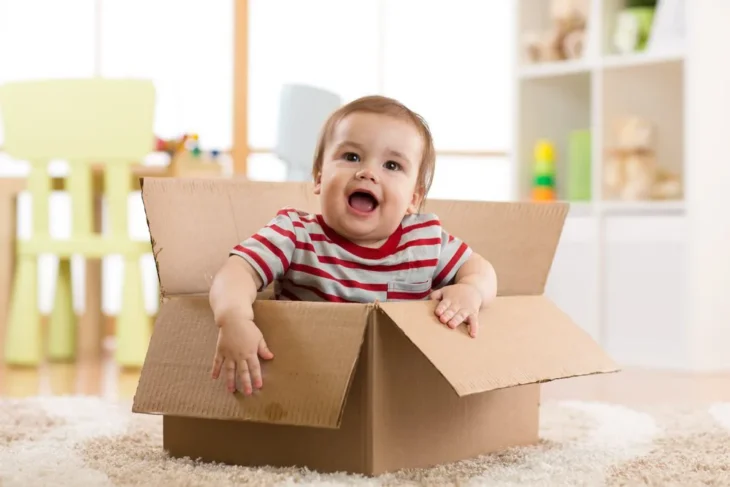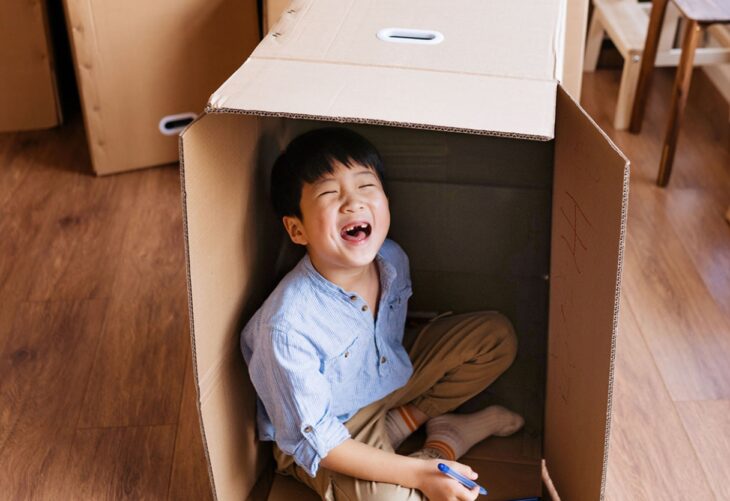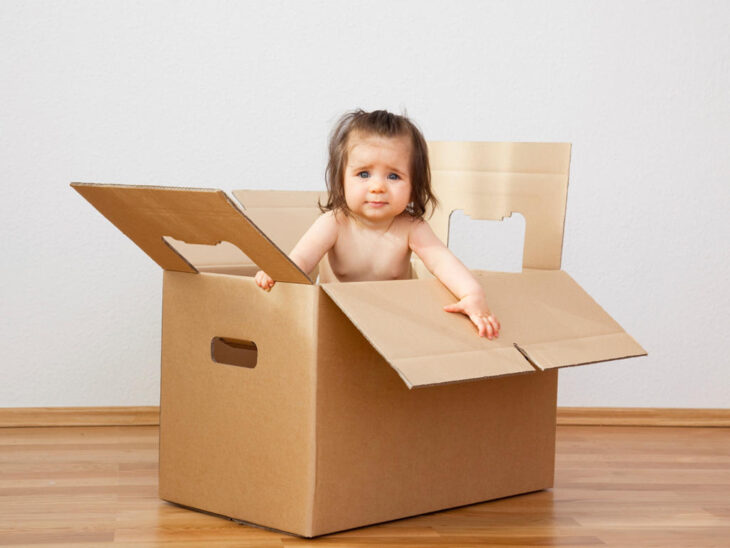Relocation is time- and energy-taking in any case; however, moving with a newborn might be an entirely different story. It is an open secret how much time babycare takes. Add here moving to a new home, there is every reason to get frustrated. But if you are realistic and schedule moving, house with a newborn can stay calm and comfy throughout the entire relocation process, without unnecessary hassle and pressure.
Below you will find answers to the most common questions about moving with a newborn and several tips to streamline your relocation.
Contents
Can you move with a newborn?
Every year, around 10%-13% of American families relocate. Families with newly born children are not an exception: they need more spacious houses to accommodate a larger number of family members. Despite the wish to provide a better environment and facilities for their kids, fresh parents are usually concerned about moving with a newborn.
Spoiler: Yes, you can move to a new house with a newborn. With proper time management, advanced planning, and a professional moving team’s assistance, the entire process will be smooth and manageable.
Generally, you can move a few weeks after a baby is born given that a mother and a newborn had no complications during or right after the delivery. Definitely, you need to follow the guidelines of your doctor. Once you’ve got the doctor’s consent, you begin scheduling.

Source: baby-chick.com
Tips to make moving with a baby
Now that you’ve got a new family member, you have to consider many more things before relocation. The preparation process might take more time as you need to take care of your newly born child, and the list of essentials is growing exponentially. The best tactic to simplify the moving process is to divide it into preparation, moving, and settling down stages. Before you start fussing over moving with a newborn and fidgeting between boxes, moving companies, and baby care, read the following tips based on the extensive experience of TrekMovers’ experts, so that you can manage moving with a newborn hassle-free.
Tip 1. Find a pediatrician in your new area. The best option is to plan a visit to your local pediatrician before the relocation to make sure your child is ready to move and to get a copy of the child’s health records. Ask your doctor about solutions for potential health disorders associated with moving with a newborn, such as eating disorders, sleeping issues, car sickness, or allergies. Besides, you can ask your doctor for recommendations — quite often doctors have information and contacts in other areas and states.

Source: ndms.com
Tip 2. If you plan to make all the packing yourself, you have to arrange a safe place for your child — far from chemicals and fragile items. Or, you can pack them during nap times. You can prepare a play area or hire a babysitter for the time of packing.
Tip 3. Do not pack your child’s stuff too early. Since you need many baby-care items daily, divide all things into Basic (or essential) and Additional. The Additional category includes multiple toys, bedding, various play seats, playmats, etc. Pack these items forward and label the box so that you can make your new home comfortable for your child as fast as possible. The Basic box should contain all the things you need for moving with a newborn and for the first time at your new place. The list of essentials may include formula/food, bottles, diapers, wipes, clothing, bibs, blankets, meds, and a few favorite toys.

Source: Euronet.com
Tip 4. Find a full-service moving company. You can check out professional movers here. The choice of movers is a challenging task for anyone, but when you are moving with a newborn you have much less time for all the prep work. Hence, you need a family-friendly moving company with a wide range of services to facilitate your relocation. Some companies do their best to make moving stress-free: upon request, they provide full-packing services, including additional plastic wrap for your furniture, and even furniture assembly services.
Tip 5. At your new home, baby’s stuff should be unpacked first. You have labeled all boxes, so it is not difficult to find the ones with baby stuff. This way you will have no headache arranging your child’s routine and making your baby comfortable at your new house.

Source: Bostonmagazine.com
Tip 6. Make your new home baby-proof. The safety of your child is the first priority, so don’t wait till you unpack everything. In fact, securing your baby from any potential hazard is easier when your belongings are still unpacked. Later, you continue baby-proof your house progressively as you continue unpacking.
Is moving stressful for babies?
To be honest, moving with a newborn is more stressful for parents. Sounds laughable, but newborns are unaware of your relocation plans, packing, traveling, hiring movers, unpacking, and all other moving-related aspects. Actually, they care about you being around. If you keep calm, plan ahead, and set up a realistic schedule, moving with baby can pass seamlessly.

Source: parents.com
Can moving affect a baby?
As long as you try to keep the same daily routine, new surroundings and traveling do not affect babies. As impracticable as it might sound, stick to the schedule you have used at home even while traveling. Regular activities and the eating schedule help you make relocation stress-free for babies and toddlers. When you are predictable and positive, your child feels comfortable and calm.
The worst age to move a child
Every situation is different, and opinions on the best or the worst age to relocate with a child can be subjective. Some babies sleep a lot and leave you some time for managing relocation, while some others require more attention at the early stage, so you might need professional assistance to help with moving or a dedicated babysitter.
On average, around the age of 3 months newborns develop some sleeping and eating habits and get used to a daily routine making it easier for you to set up plans based on your child’s schedule.
In fact, a baby’s routine is an advantage for scheduling your move. For example, toddlers sleep less; they are active, curious, and… movable. In a blink of an eye, your carefully packed and labeled boxes can be unpacked with all items scattered on the floor. Besides, you can barely guess toddlers’ mood swings while traveling.
But after all, the worst age to move a child is the age around adolescence. Have you ever moved to a new place with a teen? If the answer is ‘No’, you are lucky because those who have such an experience can confirm that taking a teenager to a new place is a true nightmare. Teens will blow your mind with complaints about leaving their best friends, sports teams, and favorite places. They get angry and sometimes aggressive, rejecting all benefits of your new location. Moving across the country with a newborn seems a joyful and exciting experience after you have relocated with your grown-up kids.

Source: babycenter.com
Can you move to another state with a newborn?
As tricky as it seems, moving with a newborn is manageable when you make all the preparations in advance.
When you plan on driving to another state, do research on family-friendly stops, parks, hotels, and restaurants equipped for babies and toddlers; otherwise, make sure to take carriers or strollers with you. Moving out of state with a newborn, keep in mind that you will need more time for traveling and consider stops for feeding and changes.
If you decide on taking a flight, non-stop options will be the best solution. And don’t forget to check the airline’s policy for strollers or baby carriers.
To make moving with a baby as seamless and hassle-free as possible, hire a professional team of movers that will help you save time. Many moving companies offer a free-of-charge quote; some of them provide virtual consulting. For example, you can handle all estimations and reservations online: get a free quote, arrange in-person or virtual estimation, request packing materials or furniture disassembly/assembly services.
Customer-oriented moving companies strive to provide the most suitable options for your unique circumstances, so do not hesitate to give a call — dispatchers will guide you step-by-step through the preparation and moving process, arranging a date, moving equipment, and trucks at your convenience.
